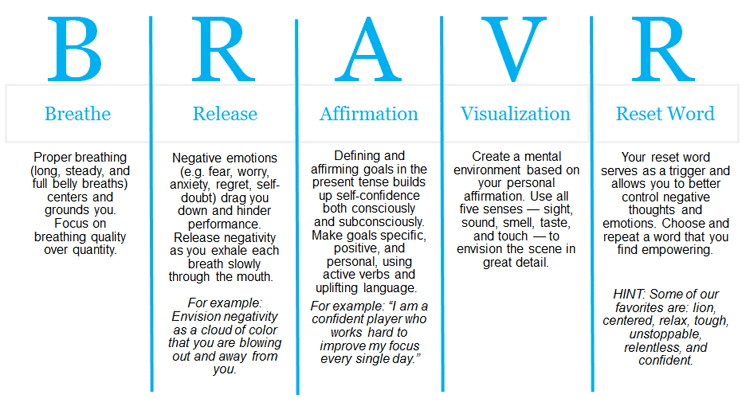“If I continue, I’ll throw up”
Or:
“Slow down, you might injure yourself”
Or my favorite:
“I can stop a few reps short, nobody will know”
I hear this every day at my gym. And it pains me to admit all these excuses come from my own mind.
But it’s true.
These are just a few of the things I tell myself when my mind tries to bargain with me. And “my little voice” won more than I care to admit.
Fortunately, I know better now. After years of training my mind, not only my body, I can successfully counteract negative self-talk with something positive, like:
“I can and I will”
or:
“I’ve done this a thousand times before”
or:
“This too shall pass”
Today I want to explore how to deal with self-talk. Specifically, how we can use different mental training strategies it to better ourselves, and make us push harder.
Let’s get to it.
Jump to:
What is self-talk?
Self-talk is the practice of mentally speaking to oneself, influencing one’s cognitive and emotional state.
It serves as a critical tool for managing thoughts, emotions, and behaviors, directly impacting performance.
Positive self-talk can boost someone’s confidence and motivation (Source), whereas negative self-talk can undermine their abilities and outcomes.
Types of Self-Talk
Self-talk can broadly be classified into two types:
- Motivational Self-Talk: This type is used to increase motivation, effort, and confidence. Phrases like “I can do this” or “I’m ready” are examples of motivational self-talk that can help people push through difficult moments.
- Instructional Self-Talk: This focuses on the technical aspects of the performance, helping people to concentrate on the task at hand. For instance, someone running might remind themselves to “breathe in for 4 steps, breath out for 4 steps”.
Effectiveness According to Dual Process Theory
The dual process theory suggests that self-talk influences performance through two pathways: motivational and cognitive.
Motivational self-talk enhances effort and persistence, while instructional self-talk improves task strategies and execution. The effectiveness of self-talk, therefore, depends on its ability to target the right pathway at the right time, aligning with the athlete’s immediate needs and the nature of the task.
How to Practice Positive Self-Talk
Positive self-talk is a cornerstone of mental training, empowering folks to overcome challenges, enhance performance, and maintain a positive mindset.
Developing this skill involves recognizing negative thought patterns, creating positive or neutral alternatives, and reinforcing these new patterns through repetition. Here’s a guide to practicing positive self-talk effectively:
Recognizing and Outlining Negative Thoughts

The first step in mastering positive self-talk is to become aware of your internal dialogue, especially under stress or during challenging moments.
Pay attention to any negative or self-defeating thoughts that arise during training or competition. These might include doubts about your abilities, criticism of your performance, or pessimistic predictions about outcomes.
Keeping a journal can be a helpful way to track these thoughts, providing a clear picture of your mental habits.
Creating Positive or Neutral Alternatives
Once you’ve identified negative thought patterns, the next step is to challenge and replace them with more positive or neutral statements.
This doesn’t mean ignoring reality or engaging in unwarranted optimism but rather reframing your thoughts in a way that’s supportive and empowering. For instance, instead of thinking, “I’ll never be able to do this,” you might say, “I haven’t mastered this yet, but I’m working on it.”
The goal is to shift your internal dialogue to be more encouraging and forgiving (Source).
Reprogramming the Mind Through Repetition
Changing deep-seated thought patterns takes time and consistent effort. Integrate positive self-talk into your daily routine, practicing it during training, before competitions, and in response to setbacks.
You can also use affirmations—short, powerful statements that reinforce your goals and values—as part of your mental training.
Repeating these affirmations regularly can help embed them in your subconscious, gradually altering your thought patterns.
Try the BRAVR Method™

As a starting point, consider focusing on the BRAVR Method™, a five-step process designed to help individuals optimize their mental training:
- Breathe: Begin with a deep breathing exercise to center yourself and focus your mind.
- Release: Actively let go of any distractions or tensions that could hinder your performance or focus.
- Affirm: Use positive affirmations to reinforce your confidence and abilities.
- Visualize: Engage in visualization techniques to mentally prepare for success in your upcoming task or performance.
- Refocus: Conclude with a strategy to maintain focus and direct your energy towards your goals.
This method encapsulates the essence of mental training, offering a structured approach to developing mental resilience, focus, and positivity.
Detailed Tips for Effective Positive Self-Talk
To make positive self-talk more effective, consider the following tips:
- Context-Specific Phrases: Tailor your self-talk to specific situations you face in your sport. This can enhance relevance and impact, making the practice more meaningful and effective.
- Thought-Stopping Techniques: When you catch yourself engaging in negative self-talk, use a thought-stopping technique. This could be a physical gesture (like snapping a rubber band on your wrist) or a mental command (“Stop!”). The goal is to interrupt the negative thought and replace it with a positive one.
- Mindset Statements: Develop statements that reinforce a growth mindset, such as “Every challenge is an opportunity to learn and grow.” These can help you maintain a positive outlook even in the face of difficulties.
- Mistake Statements: Prepare specific phrases to use when you make a mistake, like “Mistakes are part of learning. What can I learn from this?” This approach helps maintain confidence and resilience, crucial for bouncing back from setbacks.
- Consistency and Repetition: The key to altering thought patterns is consistency. Practice positive self-talk daily, making it a habit that shapes your mental landscape.
The Importance of Consistency and Repetition
Changing how you talk to yourself is akin to building muscle; it requires regular exercise and time. Consistently practicing positive self-talk, especially in diverse scenarios, ensures that these mental habits become ingrained and automatically come into play when needed most.
Go Deeper Into Mental Training
What is Mental Training?
Mental training refers to a systematic practice of psychological skills designed to enhance athletic performance, improve focus, and increase overall enjoyment in sports.
It involves a variety of techniques aimed at developing the mental toughness necessary to overcome obstacles and achieve personal goals.
I think it’s as important as physical conditioning. It helps strengthen the mind to support the body’s performance.
Types of Mental Training
Mental training encompasses several techniques, each tailored to address specific aspects of someone’s psychological state (Source). These include:
- Mental Imagery: Also known as visualization, this technique involves creating or recreating experiences in the mind. Athletes use mental imagery to visualize themselves performing at their peak, which can enhance their confidence and skill execution during actual competitions.
- Mindfulness: This practice focuses on being present and fully engaged in the moment without judgment. It helps athletes maintain concentration on their performance while managing distractions and stress.
- Self-Talk: The process of mentally talking to oneself to overcome self-doubt and maintain focus. Self-talk can be motivational or instructional, helping athletes to motivate themselves or focus on the task at hand.
Incorporating Self-Talk into Mental Training
You can incorporate self-talk into mental training routines by:
- Identifying Negative Patterns: Recognizing and understanding one’s default patterns of negative or self-defeating talk is the first step toward change.
- Developing Positive Alternatives: Replacing negative self-statements with positive or neutral ones can shift the mental narrative towards more empowering and constructive dialogue.
- Practicing Consistently: Like any skill, effective self-talk requires practice.
- Evaluating Effectiveness: Regularly assessing the impact of self-talk on performance can help athletes refine their approach, making their internal dialogue more supportive and performance-enhancing.
7 Mental Skills to Help You

Achieving peak performance requires more than physical prowess and technical skills; it demands a robust mental framework.
I’ve identified 7 mental skills of successful athletes that encompass a comprehensive approach to mental training, addressing various psychological facets essential for optimal performance.
By cultivating these skills, people can navigate the challenges of a hard training day with resilience and poise.
1- Attitude
A positive and realistic attitude is foundational to success in any sport. Successful athletes:
- Understand that attitude is a choice and opt for an optimistic yet realistic perspective.
- View challenges as opportunities for growth rather than insurmountable obstacles.
- Believe in their ability to improve through effort and persistence.
2- Motivation
Motivation can propel everyday gym people toward their goals. Key aspects include:
- Identifying personal reasons for participating in the sport, which fuels long-term dedication.
- Setting intrinsic goals that resonate with personal values and aspirations.
- Embracing the journey, not just the outcomes, maintaining motivation through ups and downs.
3- Goals and Commitment
Effective goal-setting involves:
- Establishing SMART (Specific, Measurable, Achievable, Relevant, Time-bound) goals that provide clear direction and milestones.
- Committing to a process-oriented approach, focusing on daily actions and behaviors that contribute to achieving these goals.
- Regularly reviewing and adjusting goals based on progress and feedback.
4- Self-Talk
As previously discussed, self-talk can significantly influence performance. Successful athletes:
- Cultivate a supportive and positive internal dialogue.
- Challenge and replace negative thoughts with empowering statements.
- Use self-talk to maintain focus and confidence under pressure.
5- Mental Imagery
Mental imagery enhances readiness and performance:
- Practicing visualization techniques to imagine successful execution and outcomes.
- Preparing mentally for different scenarios, building adaptability and confidence.
- Using imagery to reinforce technical skills and tactical strategies.
6- Managing Anxiety and Emotions
Emotional regulation is key to consistent performance:
- Developing strategies to manage performance anxiety, such as deep breathing, meditation, or pre-performance routines.
- Recognizing and accepting emotions as part of the competitive experience, using them constructively.
- Staying composed under pressure, focusing on the task at hand rather than the stakes.
7- Concentration
Concentration is crucial for optimal performance:
- Training the ability to focus on the present moment, task, or strategy.
- Developing cues or triggers to regain focus when distracted.
- Practicing mindfulness to enhance overall concentration and awareness.
Developing Your Own Mental Training Routine
Crafting a personalized mental training routine is essential to harness the full power of your mind to enhance performance. This process involves self-assessment, selection of appropriate techniques, and integration into daily practice.
Here’s a step-by-step guide to creating an effective mental training routine:
Step 1: Identifying Strengths and Weaknesses
The first step in developing a mental training routine is to conduct a thorough self-assessment.
This involves identifying your mental strengths—areas where you feel confident and excel—as well as your mental weaknesses or aspects that challenge your performance.
Consider factors like your ability to focus under pressure, manage anxiety, maintain motivation, and recover from setbacks. Understanding your psychological profile helps tailor your mental training to your specific needs.
Step 2: Selecting Appropriate Mental Training Tools
Based on the assessment, select mental training techniques that address your unique needs. For instance:
- If maintaining focus is a challenge, incorporate concentration exercises or mindfulness practices into your routine.
- For managing performance anxiety, learn relaxation techniques such as deep breathing or progressive muscle relaxation.
- If motivation wanes, refine your goal-setting process and explore motivational self-talk strategies.
Choosing techniques aligned with your goals ensures that your mental training is both effective and relevant.
Step 3: Integrating Mental Training into Daily Practice
Integrating mental training into your daily routine is crucial for making these skills second nature. This can include:
- Setting aside specific times for mental training exercises, such as visualization or mindfulness meditation, either as part of your warm-up routine or during downtime.
- Practicing self-talk or concentration drills during physical training to reinforce these skills under conditions similar to competition.
- Reflecting on your mental performance after training sessions and competitions, identifying what worked well and what needs improvement.
Consistency and Adaptability
Like physical skills, mental skills require consistent practice to develop and maintain. Regularly revisiting and adapting your mental training routine is also important as your needs, goals, and circumstances change. This iterative process ensures your mental training remains aligned with your evolving athletic journey.
Evaluating Progress
Regular evaluation of your mental training progress is essential. This can be done through self-reflection, feedback from coaches or peers, and monitoring your performance in both training and competitive environments. Adjust your mental training routine based on these evaluations to ensure it continues to meet your needs effectively.
References:
- McCormick, A., Meijen, C. & Marcora, S. Psychological Determinants of Whole-Body Endurance Performance. Sports Med 45, 997–1015 (2015). https://doi.org/10.1007/s40279-015-0319-6
- Tod, David et al. “Effects of self-talk: a systematic review.” Journal of sport & exercise psychology vol. 33,5 (2011): 666-87. doi:10.1123/jsep.33.5.666
- Park I, Jeon J. Psychological Skills Training for Athletes in Sports: Web of Science Bibliometric Analysis. Healthcare. 2023; 11(2):259. https://doi.org/10.3390/healthcare11020259















